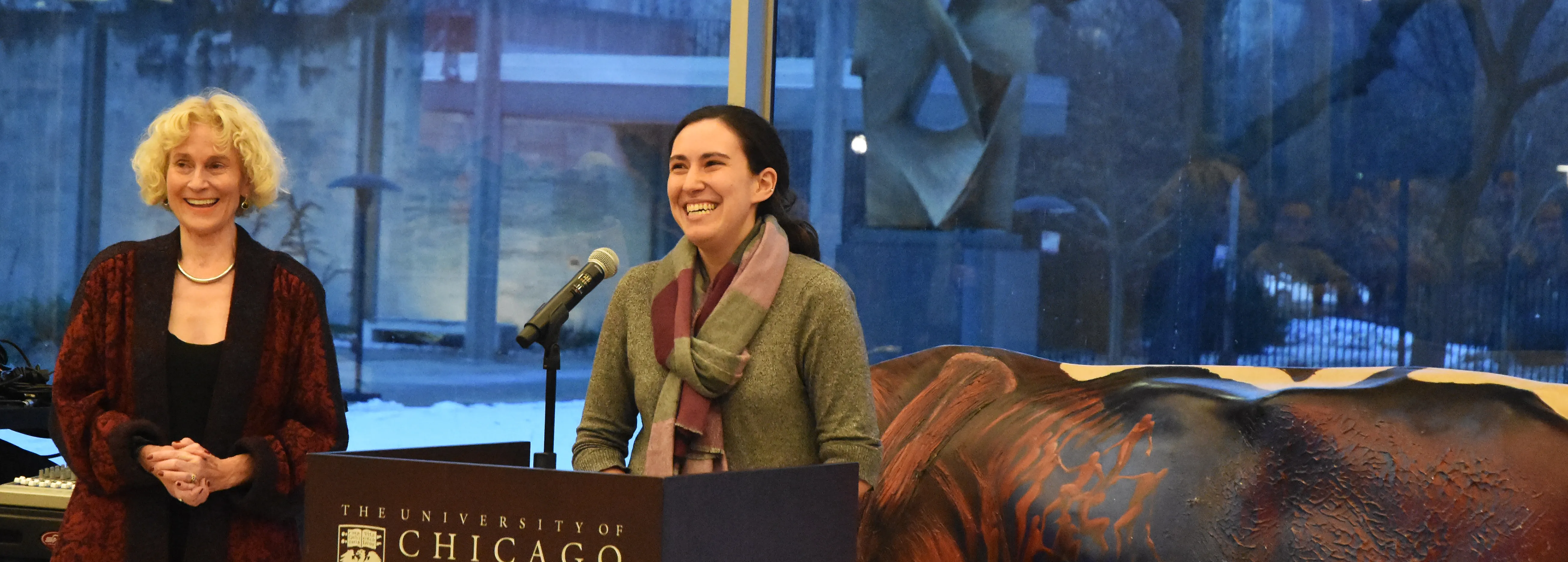Faith Laken, ’20, Awarded Law and Philosophy Fellowship to Study “The Right to be Forgotten”

Faith Laken, ’20, will receive the second annual Ernst Freund Fellowship in Law & Philosophy to study the deeper implications of an emerging practice in which people ask search engines to essentially bury undesirable online mentions by removing certain URLs from search results. The award, designed to encourage advanced law and philosophy scholarship among graduate students, was created in 2016 when Professor Martha C. Nussbaum donated a portion of the proceeds from her Kyoto Prize to the Law School and the Department of Philosophy.
The Freund Fellowship, given each year to either a law student or a graduate student in philosophy, was announced last week by Dean Thomas J. Miles, the Clifton R. Musser Professor of Law and Economics.
“Faith’s project is an excellent example of how the disciplines of law and philosophy can come together to illuminate an important contemporary issue,” Miles said. “We are grateful for Professor Nussbaum’s generosity, and we are excited to see where Faith’s inquiry leads her.”
By applying the dual lens of law and philosophy, Laken proposes an analysis that will go beyond the privacy-versus-free expression debate that has dominated discussion of “the right to be forgotten,” or the RTBF.
“The RTBF is more than a debate between privacy advocates and first amendment champions,” Laken wrote in her proposal. “It is inextricably tied up with important normative judgments about what should be protected, who should be remembered for what, who should control memory in the digital age, and what strikes the appropriate balance of interests.”
For instance: Are some crimes so serious that mentions should never be delisted from internet searches? Are there circumstances in which people should be permitted to start anew? Could the practice of delisting pages from search—a process that doesn’t result in the page itself being deleted—alter the historical record in significant ways? Would widespread support for the RTBF shift cultural norms, for instance by diminishing personal accountability and the willingness to confront past mistakes?
Laken, who said she was “very excited and grateful for the opportunity,” said the idea stemmed in part from a series of conversations she had with Eric Posner, the Kirkland & Ellis Distinguished Service Professor of Law, and Lior Strahilevitz, the Sidley Austin Professor of Law. She began thinking more deeply about the right to be forgotten over the summer while working in the Human Rights and Special Prosecutions Section at the US Department of Justice, which investigates and prosecutes cases against human rights violators and other international criminals.
“The prosecutors in that section weren’t grappling with the same ethical questions I was because they have a clear role in the system, but as an outsider, I thought a lot about some of these questions as they relate to individuals who committed serious crimes sometimes long ago,” said Laken, who plans to work for the US Department of State this summer and hopes to pursue a career in public service or academia.
Her research will include taking at least one class in the Department of Philosophy, and working with both Nussbaum and Ben Laurence, a Lecturer in Human Rights in the Department of Philosophy, as well as Posner.
“Our committee, which met last spring and also included Brian Leiter and Richard McAdams, received a large number of proposals, and the choice was difficult,” said Nussbaum, who is appointed in both the Law School and the Department of Philosophy and is the Ernst Freund Distinguished Service Professor of Law and Ethics. "But Faith's proposal seemed to us especially original, well argued, and timely. Since the idea of the prize is to write a publishable paper, we look forward to advising her and to the paper that will result."
Typically one winner is selected, but to celebrate the fellowship's first year, the inaugural fellowships went to two recipients: Taylor Coles, ’18, who is now clerking on the US Court of Appeals for the Ninth Circuit, and Molly Brown, a PhD candidate in the Department of Philosophy.

